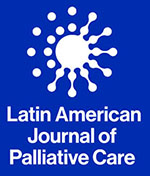Palliative care knowledge among Peruvian physicians
Is it time for an educational change?
DOI:
https://doi.org/10.59679/LAPC20230064Palavras-chave:
Palliative Care, Palliative Treatment, Internship and ResidencyResumo
Introduction: Palliative Medicine (PM) is a vital branch of medicine that focuses on the relief of symptoms while facing a life-threatening illness. In Peru, PM education is not included in the medical school curriculum and there is currently no fellowship for adequate PM training.
Objective: To evaluate Palliative Medicine knowledge among Peruvian graduated physicians who are currently training or practicing in Peru.
Methods: An observational, cross sectional and analytical study was conducted in graduated physicians from Peruvian medical schools who have or have not done a residency training and are currently residing and practicing medicine in Peru. Peruvian physicians were provided with an online link to assess their palliative medicine knowledge, primarily utilizing the Palliative Care Knowledge Test Spanish Version (PCKT-SV) which was our primary outcome variable.
Results: A total of 120 physicians answered the questionnaire from different parts of Peru. Most of them were male (55.83%) and the range of age was between 25-40 years (81.67%). Regarding knowledge levels about palliative care, we found a higher correct answers for philosophy (83.75%), followed by dyspnea (68.12%). The least proportion of correct answers were present in the dimensions of psychiatry problems (54.58%), pain (56.39%) and gastrointestinal problems (58.33%).
Conclusion: Peruvian physicians exhibit a commendable level of knowledge regarding palliative care, but issues arise in the comprehensive management of palliative patients since most of the medical practitioners lack specific expertise in this domain. Furthermore, the deficiency of undergraduate and postgraduate education on the subject is noteworthy.
Referências
Vindrola-Padros C, Mertnoff R, Lasmarias C, Gómez-Batiste X. Palliative care education in Latin America: A systematic review of training programs for healthcare professionals. Palliat Support Care. 2018 Feb;16(1):107-117. doi: 10.1017/S147895151700061X.
World Health Organization. Palliative care [Internet]. World Health Organization. World Health Organization; [cited 2022 Dec 12]. Available from: https://www.who.int/news-room/factsheets/detail/palliative-care
Pastrana T, De Lima L. Palliative Care in Latin America: Are We Making Any Progress? Assessing Development Over Time Using Macro Indicators. J Pain Symptom Manage. 2022 Jan;63(1):33-41. doi: 10.1016/j.jpainsymman.2021.07.020.
Pastrana T, De Lima L, Sanchez M, et al. Atlas de Cuidados Paliativos en Latinoamérica 2020. 2nd ed. Houston: IAHPC Press, 2021.
Al-Rawahi, A., Al-Maamari, K., Al-Kemyani, et al. Impact of the COVID-19 Pandemic on Health Behaviors Among University Students in Oman: A Cross-Sectional Study. Oman Medical Journal. 2021; 36(5), e303. doi.org/10.5001/omj.2021.97
Tarazona-Pedreros, Espinoza-Rojas. Factors associated with the level of knowledge about palliative care among medical students at a university in Lima, Peru. Rev Fac Med Hum URP. 2021; 21(3):571-579. doi: 10.25176/RFMH.v21i3.3768
Velasquez-Manrique A, Benavides-Luyo C, Chaupi-Rojas S, et al. Identificación de requerimiento de cuidados paliativos en pacientes hospitalizados en los servicios de medicina interna de un hospital de referencia Peruano. Rev. Fac. Med. Hum. 2023; 23(1):52-60. doi.org/10.25176/rfmh.v22i3.4621
Ioshimoto T, Shitara DI, do Prado GF, et al. Education is an important factor in end-of-life care: results from a survey of Brazilian physicians’ attitudes and knowledge in end-of-life medicine. BMC Med Educ. 2020 Oct 2;20(1):339. doi: 10.1186/s12909-020-02253-8.
Aliaga Chávez RA, Bustamante Coronado RI, Chumbes Sipan ML, et al. Current state and future perspectives for palliative care in Latin America with a special focus on Peru. Future Oncol. 2023 Apr;19(12):855-862. doi: 10.2217/fon2022-1033.
Wilkie DJ, Ezenwa MO. Pain and symptom management in palliative care and at end of life. Nurs Outlook. 2012 Nov-Dec;60(6):357-64. doi: 10.1016/j.outlook.2012.08.002.
Pinto E, Marcos G, Walters C, Gonçalves F, Sacarlal J, Castro L, Rego G. Palliative care in Mozambique: Physicians’ knowledge, attitudes and practices. PLoS One. 2020 Aug 24;15(8):e0238023. doi: 10.1371/journal.pone.0238023.
Tsao L, Slater SE, Doyle KP, et al. Palliative Care-Related Knowledge, Attitudes, and Self-Assessment Among Physicians in Vietnam. J Pain Symptom Manage. 2019 Dec;58(6):1015-1022. e10. doi: 10.1016/j.jpainsymman.2019.08.001.
Krautheim V, Schmitz A, Benze G, et al. Self-confidence and knowledge of German ICU physicians in palliative care – a multicentre prospective study. BMC Palliative Care. 2017; 16(57). doi:10.1186/s12904-017-0244-6
Adjei Boakye E, Mohammed KA, Osazuwa-Peters N, et al. Palliative care knowledge, information sources, and beliefs: Results of a national survey of adults in the USA. Palliat Support Care. 2020 Jun;18(3):285-292. doi: 10.1017/S1478951519000786
Downloads
Publicado
Edição
Seção
Licença
Copyright (c) 2024 Latin American Journal of Palliative Care

Este trabalho está licenciado sob uma licença Creative Commons Attribution 4.0 International License.



